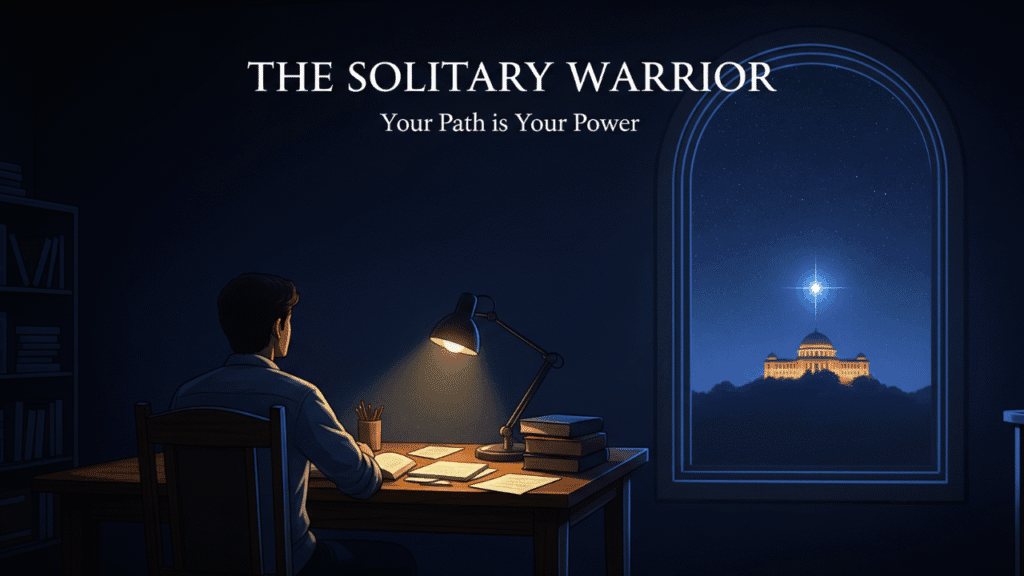
Your room can feel like a prison or a monastery. This guide helps you transform the crushing weight of loneliness into your greatest source of focus and inner strength.
There is an unspoken truth about the UPSC journey: for long stretches, it is profoundly lonely.
Your four walls become your entire world. The characters in your history books become your companions. While your friends are celebrating promotions, getting married, and living life, you are debating the nuances of fiscal policy with yourself. The silence can be deafening, and the isolation can feel like a punishment.
Many aspirants mistake this loneliness for a sign of weakness or a signal that they are on the wrong path. It is neither. This period of solitude is not a bug in the system; it is a feature. It is the crucible designed to forge the self-reliance and inner strength required of an officer.
But this crucible can also break you if you don’t learn how to handle its heat. This is your guide to transforming painful loneliness into powerful solitude.
1. Make the Shift: From Lonely to Solitary
This is the most critical mental switch you can make. The words are similar, but their universes are different.
- Loneliness is a painful lack. It is the feeling of being disconnected and wanting company you don’t have. It is a state of victimhood.
- Solitude is a chosen state. It is the deliberate act of withdrawing from the noise of the world to focus, reflect, and create. It is a state of power.
You are not “stuck” in your room. You have chosen this path. You have chosen to temporarily sacrifice social comforts for a singular, monumental goal. Every morning, when you sit at your desk, remind yourself: “I am not lonely. I am in solitude. I am here by choice, for a purpose.” This simple act reclaims your agency and transforms your room from a prison into a monastery—a place of sacred, focused work.
2. Build Your ‘Council of War’ (Not a Social Club)
In your isolation, you don’t need more friends; you need the right allies. Trying to maintain a large social circle is a recipe for distraction and guilt. Instead, consciously build a small, strategic “Council of War.”
This council might have only 2-3 people:
- The Veteran: A mentor or senior who has walked this path and can offer strategic guidance.
- The Confidante: A trusted friend or family member (often a non-aspirant) to whom you can vent without judgment. This is your emotional release valve.
- The Fellow Soldier: One, maybe two, serious aspirants who you can have focused academic discussions with. This is not for gossip or complaining, but for sharpening your intellectual sword.
Be ruthless about protecting your time and energy from anyone outside this council. Quality, not quantity, is your mantra.
3. Your Routine is Your Companion
On days when you feel utterly alone, your routine is the companion that will never desert you. It provides structure when your emotional world is in chaos. It gives you a sense of control when the future feels uncertain.
As we discussed before, your routine is your religion. On the loneliest of days, the simple act of honoring your study block, going for your scheduled walk, or completing your revision is an act of self-love. It is a promise you keep to yourself, and every kept promise builds a little more self-reliance. It is the steady rhythm that reminds you that you are still moving forward, even when you feel stuck.
4. Connect with Your Future Self
This is a powerful visualization exercise. When the silence feels overwhelming, close your eyes for two minutes.
Imagine the officer you are striving to become. Picture yourself ten years from now, sitting in your office, making decisions that impact thousands of lives. See the confidence, the wisdom, and the calm resilience on your face.
Now, understand this: the person you are today is building that future officer. The solitude you are enduring is the very training that is forging their character. You are not alone; you are in the company of your own potential. This solitary work is your gift to your future self.
The path of a warrior is, by its very nature, a solitary one. You must walk it alone. But you walk it towards a purpose that is larger than yourself. Embrace the silence. Find the strength within it. The solitude is not your enemy; it is your training ground. It is where aspirants are forgotten, and officers are born.








